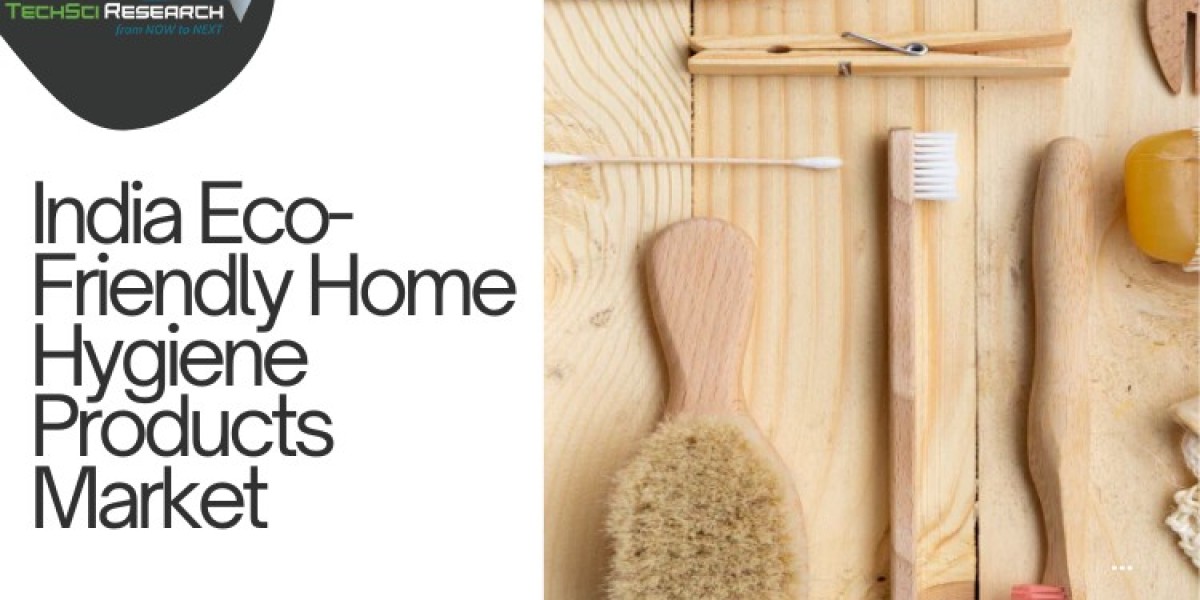India's home hygiene segment is undergoing a profound transformation. As the country embraces sustainable living practices, the demand for eco-friendly cleaning products is on a significant upward trajectory. According to TechSci Research, the India Eco-Friendly Home Hygiene Products Market was valued at USD 14.25 Billion in 2024 and is expected to reach USD 28.44 Billion by 2030, growing at a robust CAGR of 12.21% during the forecast period. This shift is being driven by a powerful mix of consumer awareness, regulatory support, and rapid digital adoption.
Industry Key Highlights
Market Valuation (2024): USD 14.25 Billion
Forecasted Market Value (2030): USD 28.44 Billion
CAGR (2024–2030): 12.21%
Dominant Distribution Channel: Supermarkets & Hypermarkets
Fastest Growing Region: Southern India
Top Growth Drivers: Health consciousness, sustainability awareness, D2C brand innovation, and digital expansion
Major Companies: The Better Home, Born Good, PureCult, GreenWorx, Vooki, Seventh Generation, Herbal Strategi
Market Overview
India’s eco-friendly home hygiene products sector is no longer a niche market. It represents a conscious lifestyle shift that’s gaining momentum across the country. Urban households, particularly in metros and Tier 1 cities, are rapidly transitioning from conventional chemical cleaners to plant-based, biodegradable, and non-toxic alternatives.
This transformation is fueled by concerns over personal health, indoor air quality, water pollution, and environmental sustainability. Consumers are becoming increasingly aware of the long-term harm caused by synthetic chemicals found in traditional cleaners and detergents. As a result, demand is rising for green alternatives that prioritize safety without compromising effectiveness.
Moreover, the segment benefits from synergy with India’s traditional knowledge systems, especially Ayurveda, and aligns well with growing governmental support for sustainability under national missions such as Swachh Bharat and Lifestyle for Environment (LiFE).
Download Free Sample Report - https://www.techsciresearch.com/sample-report.aspx?cid=8280
Key Growth Drivers
1. Rising Health & Environmental Awareness
With increasing cases of respiratory problems, skin irritations, and allergies caused by harsh chemical cleaners, Indian consumers are opting for safer options. Public discourse around the health hazards of conventional products is prompting families to switch to green alternatives that pose no risk to children, elderly, or pets.
2. Shift Toward Sustainable Living
Environmental consciousness is not just a Western phenomenon. Indian consumers—especially millennials and Gen Z—are actively seeking ways to reduce their carbon footprint. Home hygiene, a frequently overlooked segment, has now become a focal point for sustainability-driven decisions.
3. Digital & D2C Boom
The explosion of e-commerce and D2C (direct-to-consumer) brands is redefining consumer access to eco-friendly products. Online-first brands like The Better Home and PureCult are successfully engaging urban digital consumers through social media storytelling, educational content, influencer collaborations, and trial packs.
4. Institutional Adoption
Hospitals, schools, restaurants, and coworking spaces are moving towards eco-friendly hygiene solutions as part of their ESG goals and green certifications. B2B demand is gaining traction, offering suppliers a recurring and high-volume revenue channel.
5. Packaging & Product Innovation
Consumers are also evaluating the sustainability of packaging materials. Brands that offer refillable options, compostable packaging, or reusable glass bottles are gaining strong traction. Additionally, concentrated and waterless formats are reducing logistical and environmental costs.

Emerging Market Trends
1. Rise of Concentrated & Waterless Products
To minimize plastic and water consumption, many companies are launching waterless cleaners in tablet or powder form, which consumers can dilute at home. This trend is especially effective in reducing carbon emissions associated with transporting water-heavy goods.
2. Ayurvedic & Herbal Formulations
Drawing from India’s deep-rooted herbal tradition, eco-friendly brands are increasingly leveraging ingredients like neem, lemon, eucalyptus, and vinegar. These not only serve as natural disinfectants but also resonate well with Indian cultural preferences.
3. Sustainable Packaging Movement
The war on plastic is transforming packaging dynamics. Compostable pouches, paper cartons, biodegradable containers, and reusable glass bottles are becoming standard for green brands aiming to appeal to conscious buyers.
4. Smart Labeling & Certifications
Third-party certifications such as EcoCert, USDA Organic, and India Organic are becoming important consumer trust tools. Brands that highlight safety, eco-compliance, and ingredient transparency through smart labeling are gaining a competitive edge.
5. Expansion in Tier 2 & Tier 3 Cities
Once limited to metro cities, eco-consciousness is spreading to smaller towns. With digital penetration deepening and logistics networks improving, brands are successfully expanding to newer geographies where traditional retail lags in green offerings.
Segmental Analysis
By Product Type
Floor Cleaners: Among the highest-selling eco-friendly categories, with high household use frequency.
Dishwash Gels & Detergents: Gaining popularity due to direct skin contact concerns with regular products.
Toilet Cleaners: Plant-based acidic formulations are being preferred over bleach-based alternatives.
Glass & Multi-surface Cleaners: Gaining traction for daily use and residue-free results.
Others: Includes air fresheners, insect repellents, and hand sanitizers using natural ingredients.
By Distribution Channel
Supermarkets/Hypermarkets: Dominating due to visibility, shelf placement, and consumer trust.
Online Retail: Fastest-growing channel, driven by D2C sales, convenience, subscription models, and social marketing.
Convenience Stores: Still limited in eco-friendly stock but expected to grow with demand spillover.
Others: Includes specialty eco-stores and wellness outlets that offer curated organic and sustainable products.
By Region
South India: Fastest-growing region with cities like Bengaluru, Chennai, and Hyderabad leading in adoption. High digital literacy, startup presence, and cultural affinity for natural products contribute to growth.
West India: Urban hubs like Mumbai and Pune are witnessing increased demand, driven by health-aware consumers.
North India: Delhi NCR shows strong eco-conscious buying patterns, supported by NGO activities and air pollution awareness.
East & Central India: Early-stage growth, with digital access and regional awareness campaigns expected to drive future expansion.
Competitive Landscape
The India Eco-Friendly Home Hygiene Products Market is moderately fragmented with a growing number of new entrants offering niche formulations, innovative formats, and ethical branding. Strategic collaborations, influencer-led campaigns, and product bundling are common competitive tactics.
Key Market Players
GlobalBees Brands Pvt. Ltd. (The Better Home)
D2C brand offering eco-certified products with strong social media presence.
Aditya Renewtech LLP (GreenWorx)
Focuses on institutional and commercial cleaning solutions with a sustainable approach.
Be Better Personal Care Pvt. Ltd. (Born Good)
Offers products that are USDA Certified Biobased; emphasizes skin-safe and cruelty-free cleaning.
GreenPledge Products Pvt. Ltd. (PureCult)
Known for premium packaging, essential oil-based cleaners, and refill subscriptions.
Pon Pure Chemical India Pvt. Ltd. (Vooki)
Offers professional-grade eco-friendly solutions, targeting homes and businesses.
Seventh Generation, Inc.
An international player known for its commitment to sustainability and biodegradable formulas.
Herbal Strategi Homecare Pvt. Ltd.
Focuses on Ayurveda-inspired herbal solutions for cleaning and pest control.
Organica Biotech Pvt. Ltd.
Innovates in bio-based cleaning and waste management products.
Rutu Biosys Pvt. Ltd. (Biodoc)
Offers hospital-grade eco-friendly disinfectants with microbial efficacy.
Harvestwild Organic Solutions (BubbleNut Wash)
Promotes use of soapnuts and locally sourced ingredients; supports rural communities.
These players are prioritizing transparency, third-party certifications, and customer education to build trust in a relatively new but rapidly maturing market.
Future Outlook
The future of the India Eco-Friendly Home Hygiene Products Market is unequivocally green. Driven by sustainability goals, public health priorities, and consumer lifestyle shifts, the market is expected to see multi-fold growth in both urban and semi-urban areas.
As digital platforms expand their reach and environmental regulations tighten, brands that invest in product innovation, transparent sourcing, and ethical marketing will gain market leadership. Collaborations with NGOs, government schemes promoting clean living, and corporate procurement of green products are also likely to push demand forward.
Expect to see:
Greater M&A activity as large FMCG players enter or acquire niche eco-brands.
Expansion in B2B segments, especially in hospitality, healthcare, and education.
Smart dispenser and refill stations introduced in urban neighborhoods.
Rise in export potential for Indian-made eco-friendly products.
10 Benefits of This Research Report
Comprehensive market size and forecasts up to 2030
Granular segmentation by product type, channel, and region
Evaluation of emerging trends shaping consumer behavior
Competitive benchmarking of major eco-friendly brands
Identification of growth hotspots across India
Strategic insights into D2C and digital marketing trends
Analysis of institutional demand and ESG adoption
Overview of packaging and formulation innovations
Recommendations for stakeholders and new entrants
Insights into government initiatives and regulatory environment
Conclusion
The India Eco-Friendly Home Hygiene Products Market stands at the intersection of health, environment, and conscious consumerism. As Indian households, businesses, and institutions increasingly prioritize sustainability, this sector offers a compelling growth opportunity.
Brands that can successfully blend natural efficacy, convenience, affordability, and credibility will emerge as winners in this competitive space. With innovation, awareness, and policy alignment, the eco-friendly home hygiene market is not just a trend—it’s a long-term movement toward cleaner, greener living.
Contact
TechSci Research LLC
420 Lexington Avenue, Suite 300,
New York, United States- 10170
Tel: +1-332-258-6602
Website: www.techsciresearch.com






